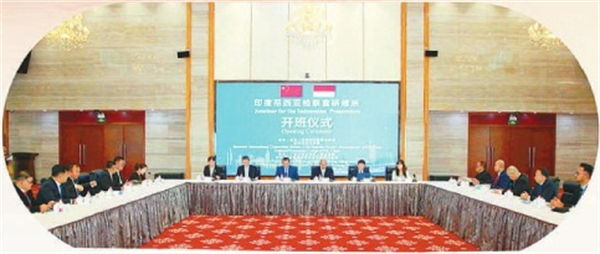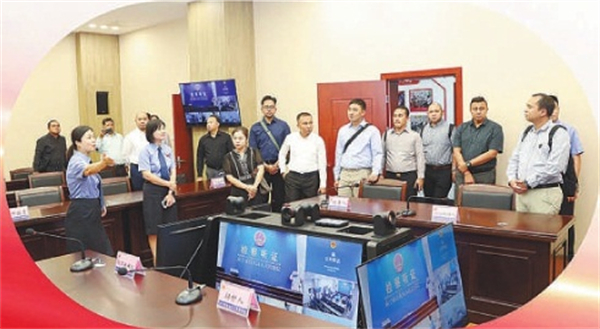
The opening ceremony of the Seminar for Indonesian Prosecutors is held at the National Prosecutors College's Guangxi Branch.

The Indonesian prosecutors participating in the seminar visit the Liangqing District People's Procuratorate of Nanning, the capital city of Guangxi Zhuang autonomous region, to learn about China's public hearing system.
A group of prosecutors travelled home to Indonesia early this month with fond memories and fruitful experiences from their 8-day study tour in China. The Seminar for Indonesian Prosecutors concluded with a full success.
The participants said that they had gained a lot from the event, expressed their gratitude, and hoped that their Chinese counterparts would visit Indonesia in the future.
They were impressed by the profound friendship shown by the Chinese people towards Indonesia and expressed a commitment to applying the knowledge acquired from China to the judicial practices in their own country.
Sponsored by the International Cooperation Bureau of the Supreme People's Procuratorate (SPP) and the National Prosecutors College of China and organized by the People's Procuratorate of Guangxi Zhuang Autonomous Region and the college's Guangxi branch, the seminar was designed to intensify the friendship between China and Indonesia and take judicial exchanges and cooperation between the two countries to a new stage. The program included lectures, site visits and symposia.
The opening lecture was delivered by Guo Lixin, Director of the SPP's Procuratorial Theory Research Institute. He presented the formation and development of Xi Jinping Thought on the Rule of Law, and expanded upon the nation's efforts in promoting socialist rule of law with Chinese characteristics under the guidance of Xi Jinping Thought on the Rule of Law, as well as new developments in China's procuratorial system.
Shen Guojun, head of the SPP's Case Management Office, gave a lecture about the fundamental role of China's procuratorial organs, their organizational structure, business scope, case management systems and experience in procedural management of case handling.
Indonesian prosecutors, including Donny Mahendra Sany, Member of the Special Task Force for Handling and Resolving General Criminal Cases and Deputy Attorney General for General Crimes; and I Made Pasek Budiawan, Head of the Section for Organizational Resource Security and Case Handling Security and Deputy Attorney General for Intelligence Affairs, asked questions and engaged in discussions during the seminar. They said China's case management system is something new to them and they wanted to study it further.
At the Liangqing District People's Procuratorate of Nanning, capital city of Guangxi, Chief Prosecutor He Xiaoying gave a presentation on the procuratorial hearings system to the visiting prosecutors.
She said that China's judicial practice aims to ensure that people feel fairness and justice in every judicial case, and that procuratorial hearings are designed to promote judicial transparency, safeguard judicial fairness, and make fairness and justice accessible, tangible and credible. During the Q&A session, Indonesian prosecutors raised questions such as "In what cases is a hearing procedure initiated?" "Who are the participants in the hearing?" and "What are the outcomes of such hearing work?" Throughout the process, the prosecutors of both countries demonstrated a shared commitment to social fairness and justice.
The seminar also included topics of common interest such as China's criminal procuratorial system and combating drug crimes and telecommunication network fraud, which led to in-depth discussions and exchanges between the Chinese and Indonesian prosecutors.
Guangxi is the only region in China that shares both land and sea borders with ASEAN countries, serving as a frontier and window for China's opening-up and cooperation with the association. The Indonesian prosecutors visited the historical and cultural city of Guilin and the coastal city of Qinzhou, exploring China's legal system and development.
While travelling on the Lijiang River in Guilin, prosecutors from the People's Procuratorate of Guilin gave a lecture on public interest litigation to their Indonesian counterparts, introducing the procuratorial model of ecological conservation featuring "specialized legal supervision + restorative judicial practice + comprehensive social governance," which aims to protect the environment and preserve the beauty of the river.
Gilang Tofani Soewito, who visited China as a participant of the Seminar for Indonesian Prosecutors in 2018, marveled at the significant achievements China's public interest litigation made in environmental protection. Given Indonesia's rich natural resources, the participants were highly interested in this innovative procuratorial system.
Qinzhou Port is the gateway of the New International Land-Sea Trade Corridor in the western region and a pivotal hub for the connection between the Silk Road Economic Belt and Maritime Silk Road under the Belt and Road Initiative (BRI). Qinzhou's prosecutors have focused their efforts on combating smuggling, protecting intellectual property rights, and supporting the construction of a safe and green port. They have taken targeted measures to safeguard the development of the Qinzhou Port Area of the China (Guangxi) Pilot Free Trade Zone, contributing to the region's high-level opening-up.
Arya Wicaksana, head of the Indonesian prosecutor delegation and District Prosecution Office of Tapin, South Kalimantan, said that port construction is crucial for the economic development of Indonesia, known as the "Nation of Islands".
"We want to possess intelligent ports like those in China, and we also want to provide legal safeguards like Chinese prosecutors," Wicaksana said.
During the program, the participants also visited the Anthropology Museum of Guangxi, the High People's Court of Guangxi Zhuang Autonomous Region, the National Judges College Guangxi Branch, the Qinzhou Nixing Pottery Museum, and the Wulei Village Primary School in Qinnan district, Qinzhou, experiencing Chinese rule of law stories in different cultural settings.
On the final day of the program, a symposium was held with both Chinese and Indonesian prosecutors taking part in discussions. Mochamad Fitriansya, head of Sub-division of Legal Considerations, Bureau of Legal and Foreign Relations of the Attorney General's Office of Indonesia, and Satwika Narendra, head of Section of General Crimes, Provincial Prosecution Office of Bekasi, gave rundowns of the prosecutorial set-up of Indonesia and the country's prosecution of general crimes, respectively.
Prior to the seminar's closing ceremony, the participants visited the exhibition of judicial exchanges and cooperation between China and ASEAN members, where they learned about the Silk Road spirit of openness, inclusiveness, mutual benefit and win-win cooperation, rekindling the beautiful memories of cooperation between Chinese and ASEAN prosecutors.
China and ASEAN countries have a long-lasting friendship. With the implementation of the BRI, China-ASEAN relations have ushered in a new era. Chinese procuratorial organs will work together with their counterparts in ASEAN countries to make greater contributions to building a closer and more prosperous China-ASEAN community with a shared future.
